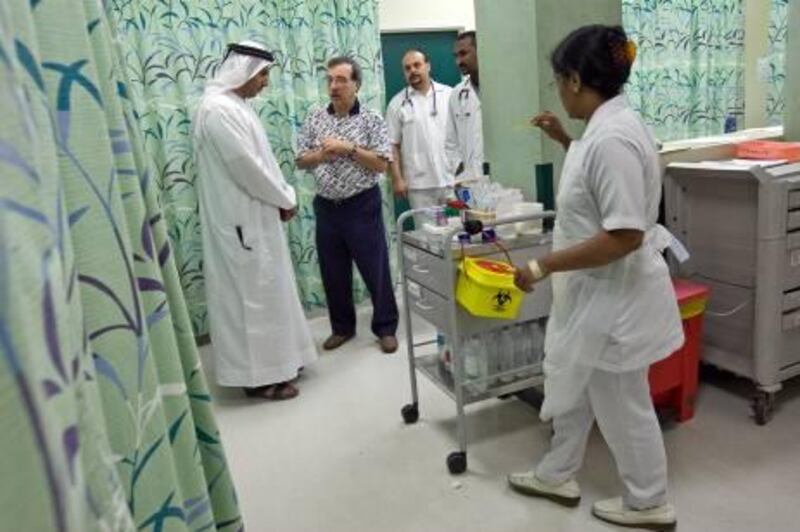AJMAN // About 40 per cent of cases seen by Sheikh Khalifa Hospital's emergency department are not emergencies, a study has found.
The findings echo similar results from around the UAE.
The hospital in Ajman, one of the busiest in the country, receives 450 to 500 emergency cases per day, said Dr Abdul Karim Halimi, the emergency department director. He attributed the high number to the facility's proximity to industrial areas and one of the two motorways linking Umm Al Qaiwain and Ras Al Khaimah.
"Most of our emergency cases are for traffic accidents and construction site-related accidents," he said. "Unfortunately, there are also a number of cases that are not very serious and could be treated in our outpatient clinics but end up in the emergency department."
He said the hospital commissioned a study on the congestion in the emergency department. The study found most people preferred the department, even those with simple ailments, which increased pressure on emergency staff.
"Doctors spent a lot of time examining some of these patients before deciding to transfer them to outpatient clinics," he said. "This is precious time spent on someone not in a life-threatening situation, yet there could be one in that situation waiting."
He appealed to patients to go to the outpatient clinic straightaway for minor issues.
Hospital emergency departments being flooded with non-emergency cases is a problem nationwide, said Dr Yousef Altair, the head of the accident and emergency department at Saqr Hospital in Ras Al Khaimah.
A study by the hospital in 2010 showed that 73 per cent of patients admitted to the department had only minor ailments.
"They come in for anything, even a common cold. The real emergency cases are few," he said.
Although there are enough family physicians in the emirate, patients do not want to wait until business hours to see a doctor, he said.
"Some [clinics] are not open 24 hours. Hospitals are open 24 hours," he said.
Some people even visit the emergency room at Mafraq Hospital in Abu Dhabi to get prescriptions renewed, said Dr Jihad Awad, the head of the emergency department.
Other non-severe cases, which account for 10 to 15 per cent of the 300 patients admitted daily, include sore throats, body pain, nausea and chronic pain.
People also visit the hospital for check-ups, he said.
Everyone from the government to the physicians who treat minor cases in emergency departments must educate the public, Dr Awad said.
"They have to inform the patient about the cases they should be worried about and the cases they should just follow up with their family doctor," he said.
Dr Omar Al Jabri, the medical director of the Ambulatory Healthcare Services Company (AHS), said people also must be educated on what is a serious ailment.
"Their first choice will be emergency partly because they think they have something serious, most of the time," Dr Al Jabri said. "Part of it is individual education."
Ehab Ahmed, a 30-year-old Egyptian, said he brought his 2-year-old son to the Sheikh Khalifa emergency department with a fever.
He said most patients prefer the emergency department because the staff there were quick to attend to patients. He also said there was nowhere else to go when the outpatient clinic was closed.
Dr Halimi said the outpatient clinic at the Sheikh Kalifah Hospital operated from 8am to 11pm.
He said the emergency department was there to deal with cases that required immediate intervention, such as traffic and construction accidents, burns, heart attacks and epileptic seizures.
zalhassani@thenational.ae






